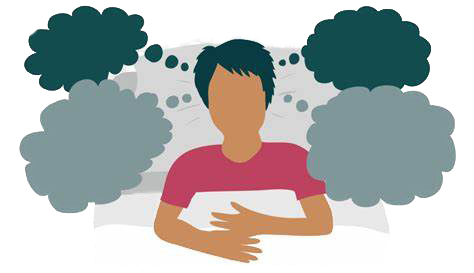“Scanxiety” is just as you may assume- the anxiety that occurs with thinking about, preparing for, going through or waiting for the results of a scan or other test. Although these feelings can be overwhelming, scans and tests are a part of the childhood cancer journey. Recognizing the effects scanxiety may have on you and managing those responses will help lessen the burden of those feelings.
 The unpredictability of the outcome of a scan can be quite stressful. Studies have actually shown that having a follow-up scan can trigger classic symptoms of post-traumatic stress disorder (PTSD). PTSD symptoms such as intrusive thoughts, irritability, and sleeplessness can interfere with quality of life, social functioning, and work. Some symptoms, such as avoiding places or things that are reminders of traumatic events or experiences, may even cause patients to delay medical scans and other critical parts of their cancer treatment or post-treatment plan.
The unpredictability of the outcome of a scan can be quite stressful. Studies have actually shown that having a follow-up scan can trigger classic symptoms of post-traumatic stress disorder (PTSD). PTSD symptoms such as intrusive thoughts, irritability, and sleeplessness can interfere with quality of life, social functioning, and work. Some symptoms, such as avoiding places or things that are reminders of traumatic events or experiences, may even cause patients to delay medical scans and other critical parts of their cancer treatment or post-treatment plan.
Some people report that a week or more before scans they start to experience Pre-Scan Syndrome (PSS). PSS is characterized by irritability, heightened emotions, and general crabbiness. This usually lasts until they receive scan results.
Anxiety about having a medical procedure or an imaging test is completely normal. The key is to be able to take steps to prevent these emotions from taking over your life or affecting the quality of your care.
Gabrielle A. Roberts, Ph.D., Pediatric Psychologist with Advocate Children’s Hospital offered the following tips for reducing stress:
 Try to make room for the feelings. While the idea of reducing anxiety about scans sounds lovely, it may not be realistic—and that’s okay. We cannot control how we feel and fighting those feelings doesn’t tend to help. Tell yourself not to think about something … and that’s all you think about. So, try to accept that this is going to be a difficult day or two—and for good reason— and even though the anxiety is present, you can still take action to do things to help yourself.
Try to make room for the feelings. While the idea of reducing anxiety about scans sounds lovely, it may not be realistic—and that’s okay. We cannot control how we feel and fighting those feelings doesn’t tend to help. Tell yourself not to think about something … and that’s all you think about. So, try to accept that this is going to be a difficult day or two—and for good reason— and even though the anxiety is present, you can still take action to do things to help yourself.- Exercise self-compassion. Be kind to yourself. Don’t beat yourself up for feeling what you’re feeling. Take the time to do things for yourself that feel comforting. Binge your favorite TV show, eat your favorite dinner or spend some time with a friend or family member.
- Control what you can control. There are some ways to build some control and predictability into a circumstance that feels very out of control and unpredictable, such as:
- Write or type up a plan for the day of the scans and the day before. How will you spend your day and evening the night before? What things can you plan for comfort? Think about how you will respond in the most stressful moments. If you anticipate a sleepless night, what can you do to help yourself relax at night and, also, how will you spend your time if you cannot sleep? Include in the plan what you will do when you wake up the day of the scan and what you will bring with you to the appointment (e.g., a book, a video game, your phone).
- Schedule scans for first thing in the morning (or whatever time is the best time for you). Early morning is often best for people as then there is less waiting time.
- Talk to your provider in advance about when and how you can expect to hear results.
- Consider bringing someone with you. Even if you don’t want to socialize, having someone by your side can be very comforting.
- Use mindfulness and meditation strategies. While we cannot make our scary thoughts and feelings disappear, we can learn to calm and refocus our minds and bodies in the midst of anxiety. There are many free online resources and apps for meditation and mindfulness. Oncology clinic social workers and psychologists are also great people to ask for information.
- Remember the positive, too. If you have been through this before and it turned out okay—try to remind yourself of that. Look for evidence of why things might turn out okay and use positive self-talk to reinforce those things. The negative thoughts come easily, try to give them some balance.
- Talk to a mental health professional. Remember that there are people out there to help you with your anxiety and stress. Don’t hesitate to ask your oncology clinic for a referral to a therapist who can help you cope.
NCCS case managers are trained in providing practical and emotional support to parents and caregivers. They can offer support during difficult times and can be reached by calling 1-800-5-FAMILY. NCCS private Facebook group provides a compassionate and supportive environment to connect with peers, share tips and receive encouragement. To join this Facebook group click here.

